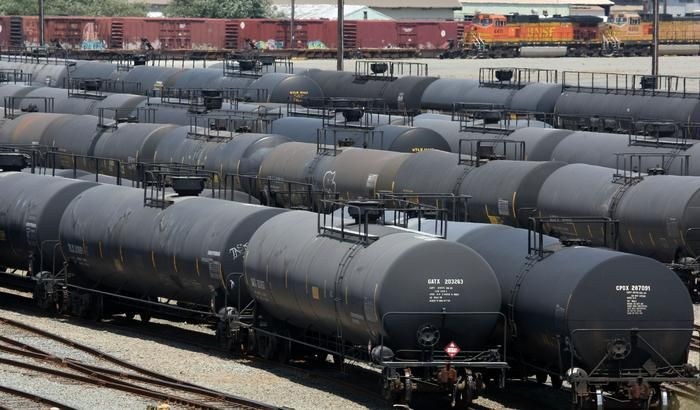Oil By Rail Protests Are Rippling Nationwide This Weekend

One year after a train carrying hazardous oil derailed and exploded in Quebec, killing 47 people, environmental groups and concerned citizens from Sacramento to Fargo to Philadelphia have coordinated protests, marches and rallies in efforts to make rail and oil companies and government agencies report publicly how much volatile crude passes through towns and major cities.
A sudden boom in oil production from the Bakken oil field has fueled a nationwide increase in crude-by-rail transport and associated accidents, prompting a heated debate about whether more regulation of oil and rail companies is needed, and whether rail companies should be legally required to publish the routes and amounts of Bakken oil they transport. The rail industry argues publishing this information would invite terrorism.
The “Oil by Rail Week of Action,” led by a coalition of environmentalists from ForestEthics, 350.org, the Sierra Club, Oil Change International and Lac-Megantic, kicked off Sunday and is wrapping up this weekend. Activists are gathering Thursday night in Chicago and Friday in Birmingham, Detroit, LaCrosse in Wisconsin, Bellingham in Washington and Washington, D.C.
ForestEthics, a San Francisco-based forestry group leading the protest in the capitol, has produced an oil train “blast zone” map estimating 25 million Americans live in areas vulnerable to an oil train explosion.
On Wednesday afternoon, activists gathered outside an espresso parlor in Fargo, North Dakota to “say no to bomb trains.”
“What right do unregulated, the-North-Dakota-way Bakken oil companies have to send tanker cars of crude, brimming with bubbly explosive gases , purposely left in the oil so they can make more money, through your city, endangering the lives of citizens and first responders?” Fargo activist Ron Schalow asked the IBTimes.
A recent Wall Street Journal investigation found that companies fracking oil from South Texas invested hundreds of millions of dollars to make the crude safer to handle, but nobody installed that equipment in North Dakota’s Bakken oil field.
“If the oil producers in the Bakken had installed the proper equipment, years ago, when they discovered the fizzy nature of the crude, like they should have been required to do, there would have been no explosions,” Schalow said.
Some states, including Wisconsin, Montana and Washington, have decided the public right to know trumps the rail company’s security concerns, while California, New Jersey, Virginia, Minnesota and Colorado have sided with rail companies. New York and North Dakota are currently weighing whether the restrictions on the information would violate their state public record laws and whether disclosing the information would threaten security more than not publishing it.
Activist from Vancouver, Washington and part of Vancouver Action Network Matt Landon began leading groups to count oil trains and estimate the amounts of crude passing through his community several months ago. The network of “train watchers” has since expanded from Washington to California and Missouri, and they are not backing down any time soon.
“The states that rolled over and signed the nondisclosure clauses pretty much shot themselves in the foot by not standing up to the railroads and providing that information to the citizens,” Landon said.
More protests are scheduled Saturday in Tulsa, Oklahoma; Rodeo, California; Sandpoint, Idaho; Seattle, Washington; Leesburg, Virginia and New Orleans, Louisiana.
© Copyright IBTimes 2024. All rights reserved.






















